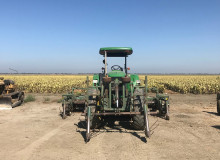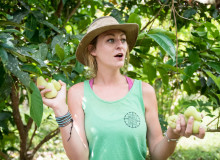Agriculture
Eckerd College
In the next story in our Tackling Food Waste series, Eckerd College student Brigit Kenney looks at the broad connection between food production to actually getting that food on our plates. It's a much larger process than she expected to see.
Texas Tech University
Taking a look into making sustainable agriculture practices in California's Central Valley, it's obvious that farmers and seed suppliers have their work cut out for them.
Nebraska's PBS & NPR stations
As the nation finds itself recovering from yet another record-setting and devastating hurricane, NET’s “On the Table” looks at how farmers and ranchers receive federal disaster relief.
Nebraska's PBS & NPR stations
In Episode 5 of NET's “On the Table,” we grapple with the shift toward polarization in American politics. Today’s political landscape is marked by partisan ideology and the farm bill is no exception.
Nebraska's PBS & NPR stations
Sales of organic food have been growing fast and show no signs of slowing down. But what do consumers think they’re buying? In Episode 4 of NET’s “On The Table,” we look at what "organic" means.
Nebraska's PBS & NPR stations
In Episode 3 of NET’s “On the Table,” NPR’s Dan Charles introduces us to a group of farmers with their noses in the dirt and explains why food companies could soon start labeling their products as soil friendly.
Nebraska's PBS & NPR stations
It's the largest hunger program in the federal government and, for people and families who can't afford enough food, it can determine whether or not they go hungry. NET's Grant Gerlock and reporters from Harvest Public Media look at SNAP.
Nebraska's PBS & NPR stations
These are the stories of where our food comes from, the people who make it, and why one law could change everything. Join NET's Grant Gerlock as he serves up the Farm Bill in delectable audio morsels.
Planet Forward Senior Correspondent | Cornell University
The meat industry receives billions of dollars in subsidies around the world, yet is one of the most unsustainable food sources. To feed the planet, we must consider alternative places to put our dollars in hopes of food secure future.
Northwestern University
Kalu Yala is host to small scale agroforestry in the Panamanian jungle — rows of alternating crops integrated with the natural environment, an image of the symbiosis that can exist between humans and the environment. Grace Wade reports for Medill.




